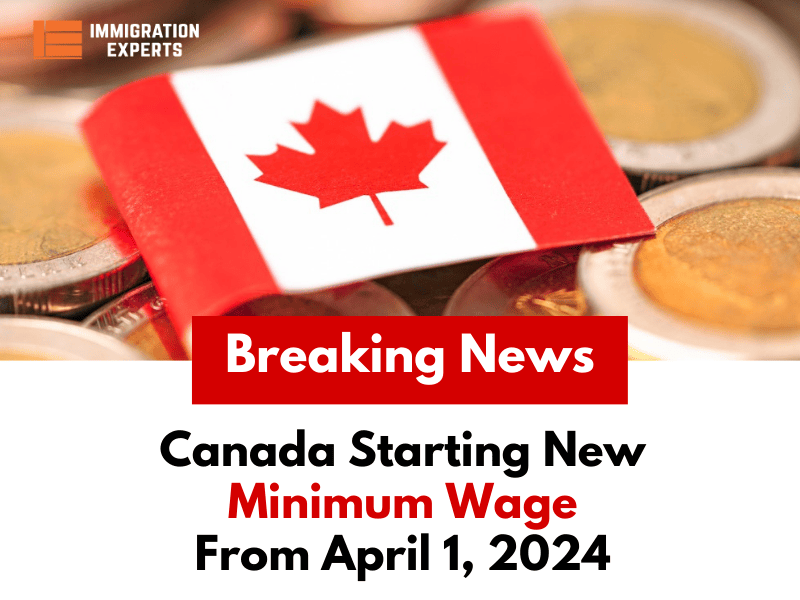051 8439995, 042 35911332

On April 1, 2024, the minimum wage for federal employees in Canada will increase from $16.65 to $17.30 per hour. This adjustment is being made to ensure that the wage keeps pace with the rising cost of living.
As a result of this change, approximately 30,000 workers in federally regulated industries will benefit from a raise of 65 cents per hour.
All private sectors regulated by the federal government in Canada, like banking, postal and courier services, interprovincial air, rail, road, and ocean transportation, must adhere to the federal minimum wage.
Moreover, employees in these sectors get paid more if the minimum wage set by their province or territory is greater than the federal minimum wage. The federal minimum wage in Canada is adjusted annually on April 1st based on the Consumer Price Index, which measures inflation.
Before this, on April 1, 2023, the federal minimum wage increased from $15.55 to $16.65 per hour.
The minimum wage went up by $1.10 in April 2023, but it only rose by 65 cents in 2024. Apart from the federal minimum wage hike in Canada, five Canadian provinces will also see a new minimum wage starting April 1, 2024.
Things You Will Find In This Page
The New Minimum Wage in Five Canadian Provinces
Alongside the federal minimum wage hike, Yukon will see its minimum wage rise by 82 cents, climbing from $16.77 per hour to $17.59, positioning it as the second-highest minimum wage after Nunavut.

Similarly, Nova Scotia’s minimum wage will go up to $15.20 per hour from the current rate of $15 per hour.
Additionally, effective April 1, 2024, New Brunswick’s minimum wage will increase from $14.75 per hour to $15.30, marking a rise of 55 cents.
Starting April 1, 2024, the minimum wage in Newfoundland and Labrador will also go up by 60 cents per hour, reaching $15.60.
Similarly, workers in Prince Edward Island (PEI) will see their minimum wage increase by 40 cents per hour as part of the April 1 hike, bringing it to $15.40.
Hourly Minimum Wage in Canadian Provinces and Upcoming Raises
Here’s a summary of the current hourly minimum wage across Canadian provinces and territories, along with the scheduled increases:
| Province / Territory | Current Hourly Minimum Wage | Next Raise Effective Date | Next Hourly Minimum Wage |
| Canada (Federal) | $16.65 | April 1, 2024 | $17.30 |
| Yukon | $16.77 | April 1, 2024 | $17.59 |
| Newfoundland and Labrador | $15.00 | April 1, 2024 | $15.60 |
| Nova Scotia | $15.00 | April 1, 2024 | $15.20 |
| Prince Edward Island | $15.00 | April 1, 2024 | $15.40 |
| New Brunswick | $14.75 | April 1, 2024 | $15.30 |
| Nunavut | $19.00 | Yet to be decided | Yet to be decided |
| British Columbia | $16.75 | June 1, 2024 | $17.40 |
| Ontario | $16.55 | October 1, 2024 | To be determined |
| Northwest Territories | $16.05 | Yet to be decided | Yet to be decided |
| Manitoba | $15.30 | October 1, 2024 | $15.80 |
| Quebec | $15.25 | May 1, 2024 | $15.75 |
| Alberta | $15.00 | Yet to be decided | Yet to be decided |
| Saskatchewan | $14.00 | October 1, 2024 | $15.00 |
List of the Federally Regulated Private Sectors?

The sectors regulated by the federal government cover a range of industries and activities:
- Aviation, including airlines, airports, and related operations.
- Banking, encompassing institutions with international permits.
- Grain handling facilities, including elevators, mills, and storage sites.
- Governance structures for Indigenous communities and First Nations.
- Maritime services such as ports, shipping, and related infrastructure crossing provincial or international borders.
- Federal Crown corporations like Canada Post.
- Postal and courier services.
- Transport infrastructure spanning national or international borders, like highways.
- Specific rail and road transport services.
- Broadcasting and communication networks, including radio, television, and telecommunications.
- Nuclear energy and related activities.
- Other critical enterprises supporting the functions of these regulated sectors.
Furthermore, municipal and private businesses in Yukon, the Northwest Territories, and Nunavut fall under specific regulations outlined in Section I of the Code.
When Will Ontario’s Minimum Wage Increase in 2024?
Ontario’s minimum wage is set to increase on October 1, 2024. The specific details regarding the amount of the increase in the hourly wage rates will be announced before April 1, 2024.
What Is the Significance of the Federal Minimum Wage in Canada?
The federal minimum wage in Canada represents the lowest hourly wage that employers are required to pay to the majority of workers in both federally regulated public and private sectors. This includes industries such as banking, postal services, and airlines.
How Frequently Is the Federal Minimum Wage Adjusted in Canada?
The federal minimum wage in Canada undergoes an annual adjustment on April 1st. This adjustment aims to align with inflation and ensure equitable compensation for employees in federally regulated sectors like banking, postal, and courier services, as well as interprovincial air, rail, road, and maritime transportation.
What Is the Highest Minimum Wage in Canada?
The highest minimum wage in Canada is CAD 19 per hour in Nunavut. Following that, Yukon stands at $16.77 and British Columbia at $16.75.Top of Form
